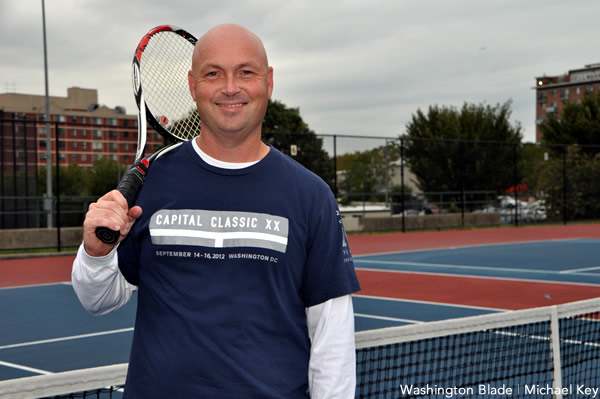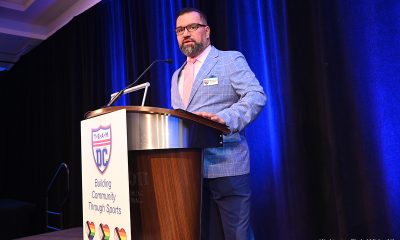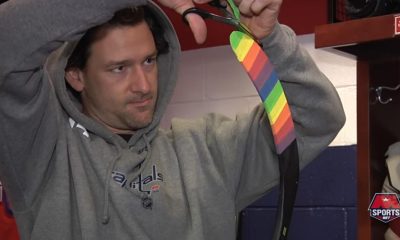Arts & Entertainment
Queery: Walker Chaffin
The tennis coach and Team D.C. honoree answers 20 gay questions
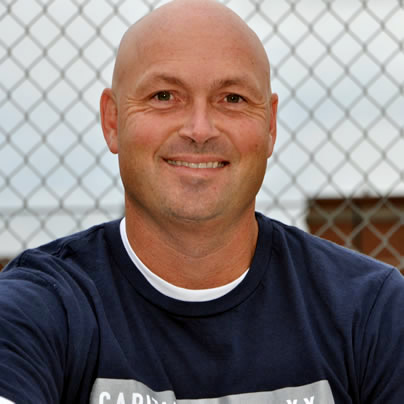
Walker Chaffin isn’t quite sure how he got into tennis as a kid. Nobody in his family played but somewhere along the way, he picked it up and it’s become a big part of his life.
As a member of the Capital Tennis Association — a gay D.C.-area league of about 300 players — for about 22 years, he just finished organizing his fifth charity tournament, the “Capital Classic,” for the group last month. This year’s recipients are the Washington AIDS Partnership and the Team D.C. scholarships. In past years, proceeds have gone to Food & Friends, Whitman-Walker, the Mautner Project and others. Over the years, Chaffin says the tournaments have raised about $100,000 for these groups.
For his efforts, he’s being honored Saturday night at the Team D.C. Champion Awards at the HRC building (teamdc.org).
“Well, you know, it’s a surprise and quite an honor,” Chaffin says. “My first thought was, ‘Who nominated me?’ but they’re very secretive about that. I’m happy we’ve been able to raise so much money. That’s why I wanted to do it, so it’s just a very nice surprise.”
The 46-year-old Alexandria, Va., native works as a law librarian by day but is active in the Association and also teaches tennis on the side. He’s been in the area his entire life except for two years of college in Minneapolis.
He and partner Brian Peteritas met last year at the Capital Classic.
Chaffin lives in Columbia Heights and enjoys, besides tennis of course, movies, TV and hanging out with friends in his free time.
How long have you been out and who was the hardest person to tell?
I have been out since 1989. I am extremely lucky because my mother made it clear early on that I was loved no matter what so coming out was not difficult for me as it was for others. Thanks Mom!
Who’s your LGBT hero?
Martina Navratilova — she is a great role model and one of the greatest players of all time. She was brave enough to come out well before others were doing it.
What’s Washington’s best nightspot, past or present?
Present – Nellie’s. Past – Tracks. Where else could you dance and/or play volleyball at 2 in the morning?
Describe your dream wedding.
Saying “I do” when it’s legal for all to marry.
What non-LGBT issue are you most passionate about?
The environment
What historical outcome would you change?
Martin Luther King’s assassination and 9-11.
What’s been the most memorable pop culture moment of your lifetime?
I would say seeing Madonna in concert for the first time. I waited in line overnight in 20 below temperatures in Minnesota to get those tickets and it was so worth it.
On what do you insist?
Respect, a great sense of humor and two DVRs.
What was your last Facebook post or Tweet?
I don’t post very often. My last post was “Paris was amazing, on my way to Barcelona” back in May.
If your life were a book, what would the title be?
“Game Set Match”
If science discovered a way to change sexual orientation, what would you do?
Nothing for myself but it would be fun to give it to Rick Santorum and the owner of Chick-Fil-A.
What do you believe in beyond the physical world?
Those we have loved and lost are still with us.
What’s your advice for LGBT movement leaders?
I don’t think I’m qualified to give them advice. I would, however, like to thank them for all their hard work.
What would you walk across hot coals for?
The people I love, a winning lottery ticket or a chance to hit with Roger Federer.
What LGBT stereotype annoys you most?
That we’re not interested in or good at sports.
What’s your favorite LGBT movie?
“Big Eden,” “A Single Man” and “Brokeback Mountain.”
What’s the most overrated social custom?
Political correctness
What trophy or prize do you most covet?
I can’t say I’d mind winning an Oscar or the U.S. Open.
What do you wish you’d known at 18?
To buy up all of the Microsoft stock.
Why Washington?
I was born here and have always loved it. I’ve almost relocated a few times but the life I have here and the friends I’ve made make it impossible to leave.
Out & About
Film festival to highlight Polish trans woman’s story
‘Kobieta Z’ screening at Landmark E Street Cinema
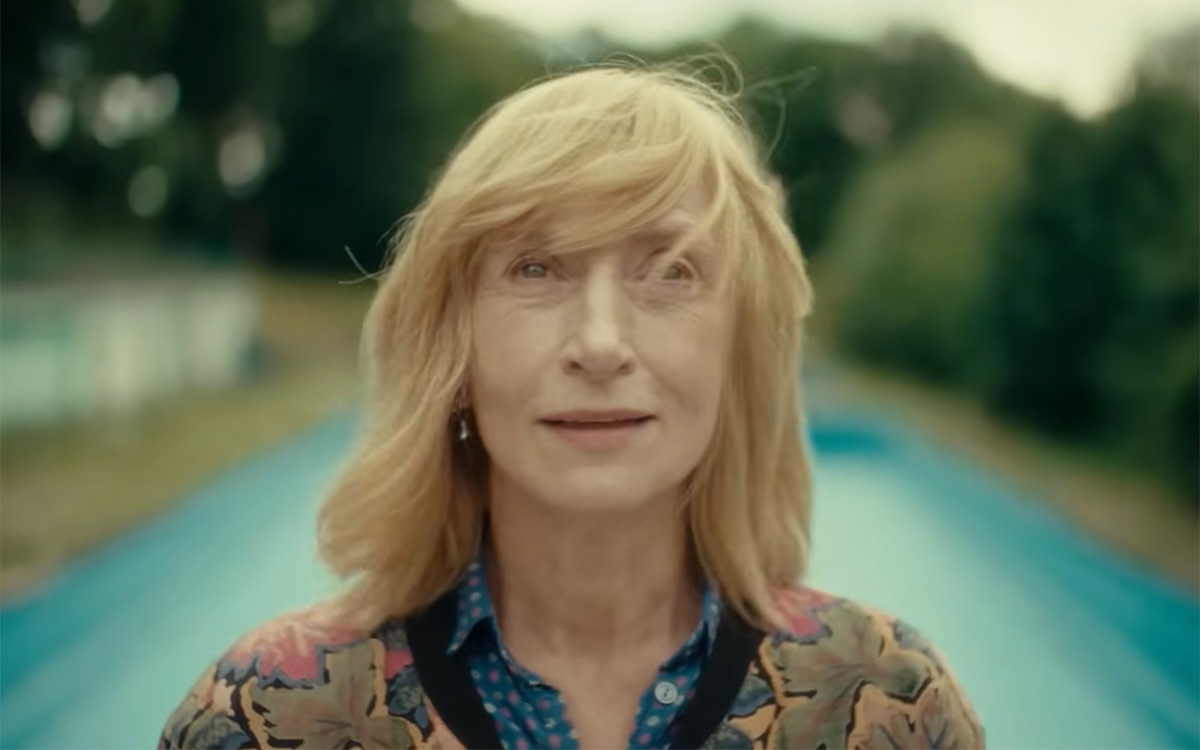
The Washington Polish Film Festival will screen “Kobieta Z” (English translation: “Woman Of”) on Saturday, May 11 at 8:45 p.m. at Landmark E Street Cinema, Theatre 6.
Having premiered at the Venice Film Festival, this Polish film breaks new ground. Starring Malgorzata Krzysztofik-Hajewska and Joanna Kulig, the movie is a sensitive and intelligent story of gender identity in a cruel world that cannot accept it and the personal love that ultimately does.
Tickets to the festival start at $20 and can be purchased on Eventbrite.
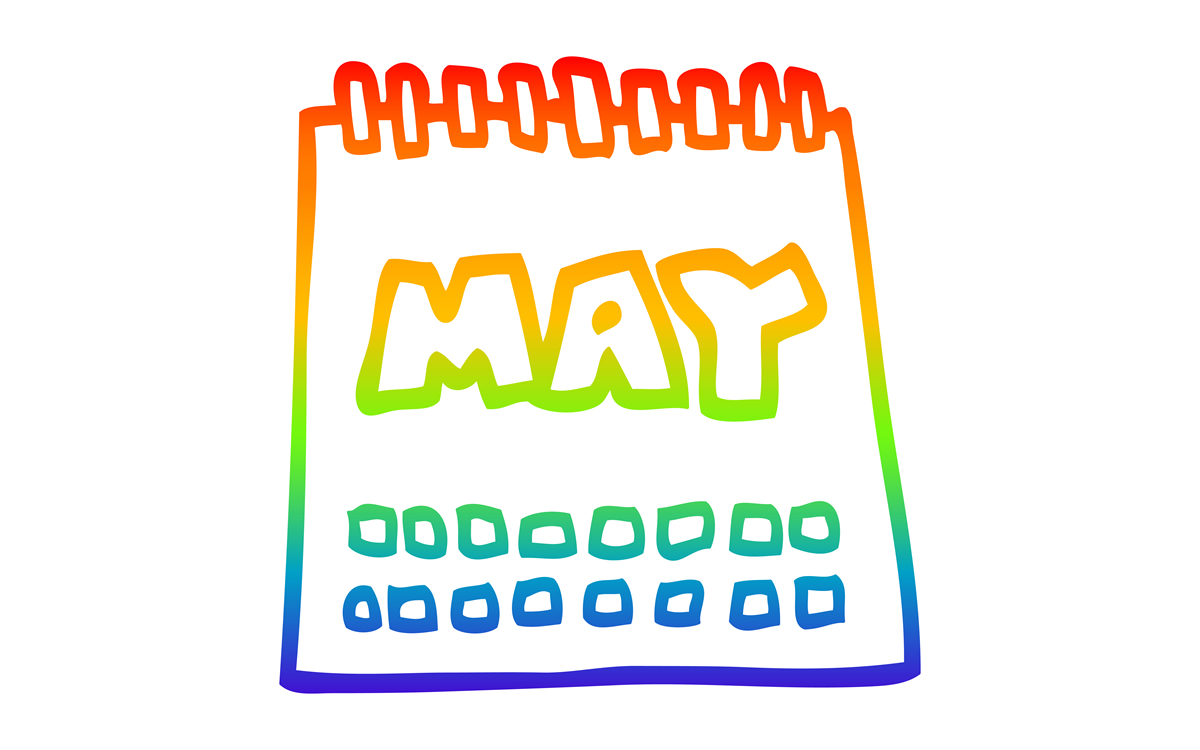
Friday, May 10
Center Aging Friday Tea Time will be at 2 p.m. on Zoom. This is a social hour for older LGBTQ+ adults! Guests are encouraged to bring a beverage of choice. For more information, email [email protected].
Go Gay DC will host “LGBTQ+ Social in the City” at 7 p.m. at Hotel Zena. Attendance is free and more details are available on Eventbrite.
Women in their Twenties and Thirties will be at 8 p.m. on Zoom. This is a social discussion group for queer women in the Washington, D.C. area. For more details, join WiTT’s closed Facebook group.
Saturday, May 11
Go Gay DC will host “LGBTQ+ Brunch” at 11 a.m. at Freddie’s Beach Bar & Restaurant. Attendance is free and more details are available on Eventbrite.
SMYAL will host “Pride Prom DMV” at 6 p.m. at a location that’s shared after attendees purchase a ticket. With a vibrant atmosphere, diverse music, and a supportive community— Pride Prom DMV is not just a celebration; it’s a declaration of identity and resilience. Through laughter, dance, and shared experiences, attendees create lasting memories and forge bonds that extend beyond the dance floor. Tickets are free and can be accessed on Eventbrite.
Sunday, May 12
Go Gay DC will host “LGBTQ+ Happy Hour” at 6 p.m. at Clare and Don’s Beach Shack. Attendance is free and more details are available on Eventbrite.
AfroCode DC will be at 4 p.m. at Decades DC. This event will be an experience of non-stop music, dancing, and good vibes and a crossover of genres and a fusion of cultures. Tickets cost $40 and can be purchased on Eventbrite.
Monday, May 13
Center Aging: Monday Coffee & Conversation will be at 10 a.m. on Zoom. This is a social hour for older LGBTQ+ adults. Guests are encouraged to bring a beverage of their choice. For more details, email [email protected].
“TRANSEND: Transgender & Nonbinary Support Group” will be at 4 p.m. at the Pride Center of Maryland. This event will be a safe space to discuss hot topics, education and incentives while enjoying food. This event is free and more details are available on Eventbrite.
Tuesday, May 14
Pride on the Patio Events will host “LGBTQ Social Mixer” at 5:30 p.m. at Showroom. Dress is casual, fancy, or comfortable. Guests are encouraged to bring their most authentic self to chat, laugh, and get a little crazy. Admission is free and more details are on Eventbrite.
Trans Support Group will be at 7 p.m. on Zoom. This group is intended to provide emotionally and physically safe space for trans people and those who may be questioning their gender identity/expression to join together in community and learn from one another. For more details, email [email protected].
Coming Out Discussion Group will be at 7 p.m. on Zoom. This is a peer-facilitated discussion group and a safe space to share experiences about coming out and discuss topics as it relates to doing so. For more details, visit the group’s Facebook page.
Wednesday, May 15
Job Club will be at 6 p.m. on Zoom. This is a weekly job support program to help job entrants and seekers, including the long-term unemployed, improve self-confidence, motivation, resilience and productivity for effective job searches and networking — allowing participants to move away from being merely “applicants” toward being “candidates.” For more information, email [email protected] or visit thedccenter.org/careers.
Thursday, May 16
Virtual Yoga with Charles M. will be at 7 p.m. on Zoom. This is a free weekly class focusing on yoga, breath work, and meditation. For more details, visit the DC Center for the LGBT Community’s website.
Movies
Deliciously queer ‘Dead Boy Detectives’ a case worth taking on
A light-hearted, smart, and complex sensibility behind the fantasy
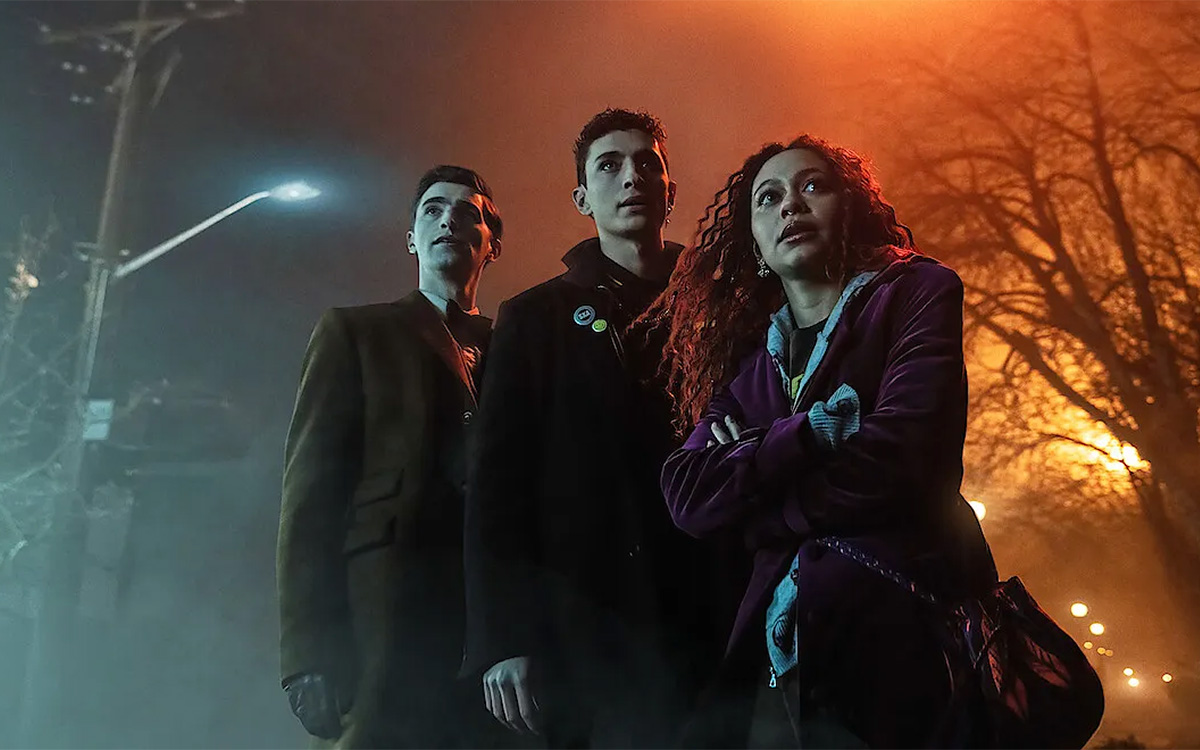
Believe it or not, there was once a time when the Hollywood entertainment industry didn’t take comic books very seriously — but then, neither did anyone else.
In the early days, comics were dismissed by most adults as childish fantasy; indeed, those with a penchant for clutching pearls saw them as a threat to their children’s intellectual development and therefore to the future of America itself. Their popularity could not be denied, however, and Hollywood, ever eager to capitalize on a trend, was certainly hungry to get a piece of the action.
The problem was that the studio lackeys assigned to adapt the comics for the screen during those “golden years” were never actually fans of the comics themselves. The result was a parade of kitschy – if occasionally stylish – low-budget serials, kiddie matinees, and “B movies” which operated, for the most part, at the level of cartoons, and mindless ones at that. Even in the 1960s, when comics like “X-Men” had begun exploring mature themes and turning the comic book into a counterculture phenomenon, the best that Hollywood – now deploying the then-relatively new medium of television – was a “Batman” series that felt even campier than the corny serials of three decades before.
Yet despite being treated as a throwaway genre with no cultural significance or intellectual value, the popularity never went away – and with the generation that grew up with comics now old enough to be working in Hollywood themselves, a new burst of creativity began to infuse the screen’s version of the genre with the kind of nuance and sophistication that fans had always known was there. Fast forward to 2024, when comics-based content dominates not just our movie screens – nobody needs to be told about the way it has shaped (some would say crippled) the mainstream film industry for the last decade or so – but all our other screens, as well. And while much of the material that has resulted from this obsessive fascination with comics (and comics-adjacent material like “Star Wars” and other similar fantasy franchises) often suffers from the same safe “appeal to the LCD” mentality that robbed the vintage stuff of its potential, the artistry of creators who are fans themselves has also resulted in a lot of genuinely good storytelling.
In the latter category, we offer up “Dead Boy Detectives” – a new series derived from a supplemental thread in renowned comics creator-turned-bestselling author Neil Gaiman’s groundbreaking “Sandman”, which debuted last week on Netflix – as a counter to the increasingly popular notion that comic books have hamstrung the industry’s creativity.
Based on characters and storylines that emerged during the original run of Gaiman’s iconic book (published by DC Comics via its Vertigo imprint), it’s a fresh, funny-yet-emotionally engaging supernatural saga in which two ghosts who died in their youth – the titular “Dead Boys” – operate a detective agency in London, solving mysteries for other spirits who need closure before moving on to the afterlife.
The boys – Edwin (George Rexstrew) and Charles (Jayden Revri) – are not themselves quite ready to depart the earthly plane, however; on the contrary, they operate on the lam, making sure to keep one step ahead of Death (Kirby Howell-Baptiste, reprising her role from Netflix’s acclaimed “Sandman” adaptation) so that she can’t drag them out of it before they’re ready. Something of a mismatched pair (both died at the same English boarding school, but 60 years apart), they nevertheless have established a fondness for each other and a dynamic together that makes them an excellent team in solving the supernatural crimes they encounter in their work. Their biggest handicap is the difficulty of dealing with the living – who, for the most part, cannot see or hear them – when it becomes necessary in an investigation. Fortunately for them (and for the story, of course), they find a solution to that issue during episode one.
Enlisted by the ghost of a Victorian child to rescue the human medium – Crystal Palace (Kassius Nelson), possessed by a former boyfriend who was actually a demon (David Iacono) – that has been trying to help her “cross over”, the detectives find themselves with a living ally who can not only interact with them, but also with the “real” world in which they do their work. With Crystal on the team, they are soon called to an American seaport town to investigate the disappearance of a child – who, it turns out, has been abducted by a witch (Jenn Lyon) intent on draining her youthful essence in pursuit of her own immortal beauty. We don’t want to give anything away, but during the course of the case they not only incur her wrath, they set off alarm bells on the “other side”, calling attention to the fact that two AWOL souls are still lingering in the human world.
Things get worse for them in the second episode, when Edwin attracts the interest of the local “Cat King” (Lukas Gage, “White Lotus,” “Down Low”) and subsequently finds himself cursed to remain until he has “counted all the cats” in town – a daunting and maybe impossible task.
Though jumping into the second installment might feel like getting ahead of ourselves, it’s important to look ahead for the sake of exploring the show’s deliciously pervasive queerness, so forgive the spoiler-ish leap; because it is Edwin, who died in an era long before being openly attracted to other boys could even be discussed, let alone accepted, that serves to root the story’s tension into a real-life context that helps all the supernatural nonsense connect with relatable real-world experience and emotion. Uncomfortable more than a century after his death with the secrets of his own sexuality, he finds himself hampered by his jealousy of the obvious growing attraction between his literal BFF and the new girl psychic who has joined their team – as well as vulnerable to manipulation from both the witch who has it in for him and the Cat King who… well, let’s just say that Edwin’s cat-counting curse could be easily lifted if he would only accept another way to appease the libidinous (and far from unappealing) feline monarch.
It’s best we stop there, before we reveal too much; the series – developed by Steve Yockey and produced by (among others) original author Gaiman and out queer TV impresario Greg Berlanti – sets up its story arc very plainly from the beginning, so savvy viewers will read the subtext long before any definitive events take place, but much of what makes it fun is watching how it all unfolds.
Suffice to say that, with engaging performances from all its players, a light-hearted, smart, and complex sensibility behind all of its fantasy elements, and a palpably queer vibe that leaves plenty of room for allies to jump on board, too, it’s one of the more worthwhile (and meaningful) “comic book” stories to hit our screens in a long while.
Maybe more importantly, it’s also entertaining, which makes it easy for us to recommend “Dead Boy Detectives” as a case you’ll definitely want to accept.
-
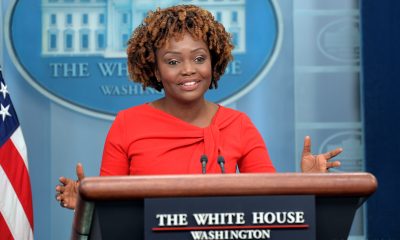
 The White House2 days ago
The White House2 days agoEXCLUSIVE: White House Press Secretary Karine Jean-Pierre on speaking out and showing up
-

 Middle East2 days ago
Middle East2 days agoTel Aviv authorities cancel Pride parade
-
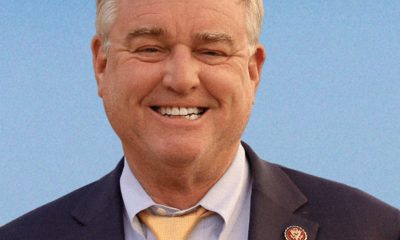
 Maryland4 days ago
Maryland4 days agoTrone discusses transgender niece
-
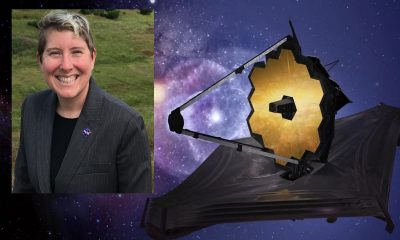
 The White House3 days ago
The White House3 days agoJane Rigby awarded Presidential Medal of Freedom

